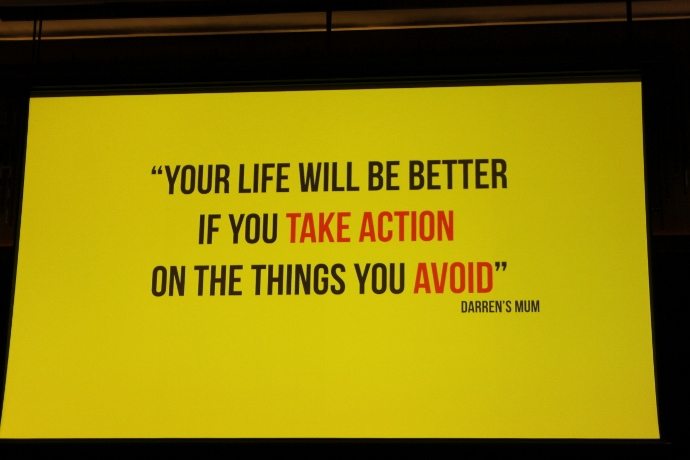This time last week I was attending #PBEvent (otherwise known as the Problogger Conference) which was held a the RACV Pines Resort on the Gold Coast in Queensland (great place for a holiday if you are a golfer or have kids under the age of 6 as the pools with slides are fabulous for that age group, oh and totally delicious food).

RACV Royal Pines Resort Gold Coast Problogger
As someone who attends conferences every year in some form or other, and knows that choosing a conference session to attend can be a bit like playing a game of spin the bottle (if you don’t already know the session presenter’s style of delivery), it’s important to have a strategy to get the most out of every learning opportunity presented.
There have been many occasions when sitting in a session and one of my collegues (or I may think) that this session is not what I’d hoped for in some way or other. It’s very easy then to just turn off and stop taking any notice, but really, if you do that, you’re wasting a great learning opportunity which is why I thought I’d share (from the experience of being a seasoned conference attendee) my thoughts on getting the most out of every learning opportunity at a conference.
How to Get the Most Out of Every Conference Session
1. Topic is Exactly What You’re After and the Presenter is Superb
This is always a delight when you find yourself in this kind of session. Taking copious notes during the session is something you’re likely to do. But it’s afterwards when you get back into your normal life that all that great content needs to be put into action. It’s great isn’t it when this happens But how often do you go back home with your raft of notes and then actually make any changes or apply what you’ve learned?
What’s your next step?
After the session go back through your notes and create a step-by-step action plan, make sure they are all in a ‘next-step’ format, rather than a bit ‘project goal’ type of action.
2. The Topic is Exactly What You Want but the Presenter is Not Great
This can be a disappointment. But rather than feel that it’s a waste of time, and start resenting that you’re spending your time at this session. It’s time to figure out what it is about that presenter’s style or content that is making it a disappointment. Take notes during the session on any good content that you may want to follow up on (as in point 1 here), but also take notes on what the presenter is doing wrong, or how they can improve their presentation delivery style.
What’s your next step?
Think about what worked and what didn’t during that session. What was it about that presentation that missed the mark. Whatever stage of career you’re in we can all learn how to be a better presenter of information (even if we never plan on presenting conference sessions or teaching anyone anything). Why is this? Well, we all have to present information to people, whether it’s our boss, family or clients. Take this session as a lesson in how not to deliver a message.

Getting my camera off the automatic setting at the Olympus workshop at PBEvent
3. The Topic Isn’t What You Thought it Would Be
Topic disappointment is sometimes a sad fact of conference going. Sometimes you end up in a session where the description doesn’t match (in your mind) the content delivered. This is an opportunity to be open to what is being delivered. You may not have thought that this topic is of benefit to you, but if you close yourself off to it (and spend the rest of the session surfing the internet on your mobile phone), you may miss out on something that could be of benefit to you.
What’s your next step?
Stay engaged during the session and see if you can see any parrallels to your topics of interest, or if there is any way you can include the information into what you already do. Maybe you have boxed yourself up too small and this could be presenting a new opportunity for you to take.
4. The Topic is Too Advanced for You
OK, so you’re sitting there and suddenly you think … “Oh no, this is all too technical and it’s going right over my head.”
What’s your next step?
Again, stay off your phone and instead take notes. If you have interest in this topic (which is probably why you decided to attend it to start with), this session is telling you that you have lots to learn. Take notes so you can do further research when you get home as there is obviously a gap in your knowledge that needs more study.
5. The Topic is Too Basic for You
Ok, so you’re sitting there thinking “I know this…boring”. This can happen sometimes if you’re a subject matter expert in an area.
Instead of turning off, why not take this as a learning opportunity and see – is there one point that I can glean from this presenter. I believe that if I get one new tidbit or even just a different way of approaching a subject then my time has been worthwhile.
Alternatively, why not look at their teaching and presenting style and see if you can get any tips to include in your own presentations.
What’s your next step?
Remember that nobody is perfect, we all need to keep learning and growing no matter how long we’ve been at it.
6. The Topic is of Interest But You Realise that You Just Don’t Have the Time to Put Everything Into Action
So you’ve chosen a session, the presenter is good, the topic is interesting but as you sit there you start to realise the complexities of the topic and just how much time it will take for you to go away and put the learning into practise, and sometimes you just don’t have that time.
What’s your next step?
Knowing about the topic, having an understanding of it is good, as then you can find someone else to do the work for you. Maybe you need to outsource work to someone else (particularly if it’s something you realise that really needs to be done). At least having a grasp of the technicalities will help you have conversations with the technical person you choose to do that work for you.
7. The Topic Isn’t of Interest but the Presenter is Superb
Ok, so sometimes there is a plenary session that’s for everyone, or there isn’t a session on in that time slot that floats your proverbial boat. What to do? Well you can skive off or you can attend it and be open to learning something new.
What’s your next step?
You’ve realised that the topic is never going to be for you, but the presenter is engaging and the teaching well delivered. ;Now it’s time to take notes on just what is making the presenter so great. Is it the way they wrap their points up into an overarching story or theme? Is it their humour or something in particular about their delivery style. Study their body language, speech patterns and how they present their topic. You can learn to become a better presenter too (even if you’re never planning to get up on stage).
8. After the Conference
Go through all your notes and make a detailed action plan breaking down these actions into easily do-able steps. Then add some dates to those actions (be realistic on them to) so that you really do put into practise everything you learned during your time at the conference.
Organise your actions and ensure that those that will have the most impact are tackled early on after the conference while you still feel the motivation to make those changes, or put in the effort.
What’s your next step?
As Darren Rowse’s (aka Problogger) Mum says:
Want to Become a Better Blogger?
And if you’re interested in a Virtual Ticket to the Problogger Conference that I just attended these are now available – there are 50 session recordings from the 2016 conference from some amazing speakers on a range of relevant topics for any blogger (or would-be blogger).
Get your ticket here or just find out more.




















This is good information for any conference goer. Timely, too, since I’m going to one tomorrow.
Hope you have a great time!